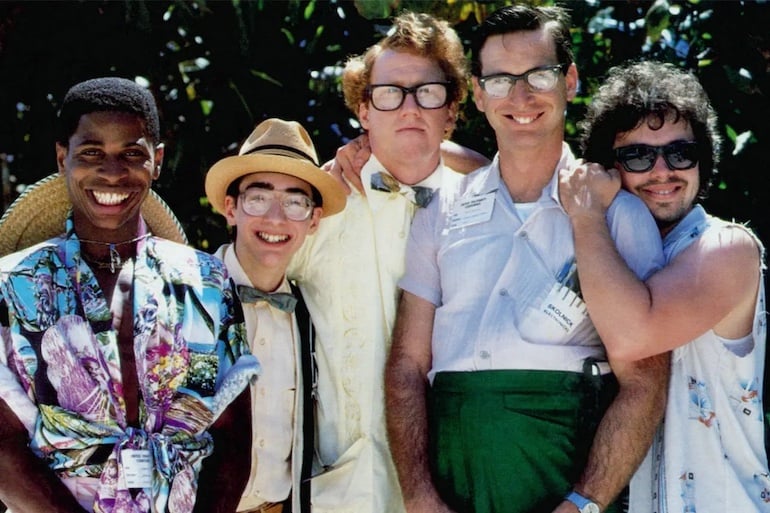In the eighties and nineties, Hollywood perpetrated perhaps one of the greatest disservices to the development of the global tech sector and in particular to the career development of generations of young people.
Still, at the time, I found myself laughing along with everyone else as the ‘computer geeks’ and ‘electro-nerds’ bumbled their way across the silver screen providing the comedic antithesis of stereotypical heroes like Travolta’s ‘Danny Zuko’ in Grease.
Perhaps at the time it was merely art imitating life. However, efforts to unwind the mythology of the ‘tech world’ being a career aspiration limited to the anti-hero cast of Revenge of the Nerds has taken more than a generation.
It has taken decades and more than a few ‘Bill Gates’ and ‘Mike Cannon-Brookes’ for Australian school students and graduates to see the modern tech-sector as the anvil upon which they can forge a dynamic and well-paid career.
This has been part of the mission of the Digital Skills Organisation (DSO) since it was established in 2020 as one of the recommendations arising from the Strengthening Skills – Expert Review of Australia’s Vocational Education and Training System report by the Hon Stephen Joyce.
Since its inception the DSO has been championing an employer-lead, skills-based approach that recognises digital skills are needed by everyone and every employer, tech and non-tech.
By connecting employers with training providers, the DSO is designing new ways of training to equip learners and employees with the skills needed to meet a rapidly changing, technological future.
It is a mission to make digital skills and technology careers more accessible to more people and quickly — regardless of backgrounds, training or experience.
Without a serious effort on the part of industry, educators and government, Australia could be left behind, dogged by slow growth and development in a world where investment in the tech sector is advancing at a frenetic pace. The eventual impact this will have on jobs, investment, and productivity is huge.
The cost of inaction
The opportunity cost of inaction is that Australia has the potential to become one of the tech industry powerhouses within our region, if not the world.
It may sound unrealistic, however, Australia is already becoming a world-leader in the technology sector. With the right investment in training both in funding and introducing faster ways to train plus industry partnerships, our nation has the potential to deliver thousands of jobs and billions from tech jobs in economic activity over the coming decade.
This is a trend we’ve already been seeing for more than a decade. Since 2005, tech jobs have grown by 66%, compared to an average jobs growth rate of 27% across the economy.
In the 2021 financial year, despite the economic devastation of a global pandemic, the tech sector contributed $167 billion to the Australian economy – that’s 8.5% of GDP.
During the 2021 financial year, there were 861,000 Australians employed in the technology sector. Even during the Covid-19 pandemic, the tech sector generated 65,000 jobs; the economy’s second highest job creator behind retail.
Near term, by 2030, the technology sector has the potential to contribute more to GDP than either primary industries or manufacturing.
However, as a nation we need the ‘ticker’ to take hold of these opportunities and drive them into reality.
A 2021 report from Accenture found that Australia will need an additional 60,000 Australians to reskill and join the tech sector over the next five years to meet demand, and 12,000 additional students entering tech jobs directly from study.
That requires action now.
We need the new Albanese Government to stand firm on its pre-election commitment to help drive tech jobs as the building blocks of our ‘new economy’. Prior to the election the Prime Minister dedicated a new Labor government to the vision of having over a million people employed in tech jobs by 2030.
It’s a welcome commitment that will require an overarching strategy supported by a common language which provides clarity on priorities. It will need an agile and flexible approach to training which meets the needs of employers and learners by bringing together traditional and non-traditional forms of education like micro-credentials and standards. It will also be critical that we raise digital literacy across the whole population.
It’s been a long time since I watched the ‘nerds’ of the 80’s turn-the-tables on the class ‘jocks’ in Revenge of the Nerds. Since then, I had an extensive career in both the British Army and Australian Defence Force and shifted my career into the tech sector with my focus now on training, stakeholder management and digital transformation.
Over the years, I’ve conversed with many colleagues from diverse backgrounds and often found us circling back to conversations about the future landscape of Australia’s workforce and how it impacts the future careers of our children.
There is so much opportunity for young Australians to lead the tech world. Now, more than ever, I think we all need to be motivated to expand that conversation to inspire young Australians and, in the process, demystify careers in technology.
Unlike the cultural stereotypes of decades past, there’s no reason any of our children could not be a founder of the next ‘tech unicorn.’ What we need is the right conversations, the right training and the right leadership to make it a national reality.




















Trending
Daily startup news and insights, delivered to your inbox.